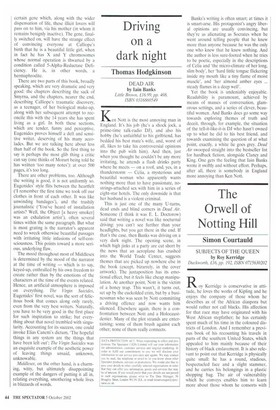Driving on a dark night
Thomas Hodgkinson
DEAD AIR by kin Banks Little Brown, £16.99, pp. 408, ISBN 0316860549 Ken Nott is the most annoying man in England. It's his job (he's a shock jock, a prime-time talk-radio DJ), and also his hobby (he's unfaithful to his girlfriend, has bedded his best mate's wife, and, worst of all, likes to take his controversial opinions into the pub with him). And then, just when you thought he couldn't be any more irritating, he attends a flash drinks party where he meets — on a roof, and, yes, in a thunderstorm — Celia, a mysterious and beautiful woman who apparently wants nothing more than to have passionate, nostrings-attached sex with him in a series of eight-star hotels. The only downside is that her husband is a violent criminal.
This is just one of the many U-turns, dead ends and blind corners in Dead Air. Someone (I think it was E. L. Doctorow) said that writing a novel was like nocturnal driving: you can't see further than your headlights, but you get there in the end. If that's the case, then Banks was driving on a very dark night. The opening scene, in which high jinks at a party are cut short by the news that an aeroplane has crashed into the World Trade Center, suggests themes that are picked up nowhere else in the book (except, bizarrely, in the cover artwork). The juxtaposition has its emotional effect, but it feels like cheap manipulation. At another point, Nott is the victim of a honey trap. This wasn't, it turns out, set up by the cuckolded crim, but by a businessman who was seen by Nott committing a driving offence and now wants him silenced. Elsewhere again, there is a confrontation between Nott and a Holocaustdenier. Many of the plot strands are entertaining; some of them brush against each other; none of them really connects.
Banks's writing is often smart; at times it is smart-arse. His protagonist's angry liberal opinions are usually convincing, but they're as alienating as Socrates when he went around telling people that he knew more than anyone because he was the only one who knew that he knew nothing. And the author is less sure-footed when he tries to be poetic, especially in the descriptions of Celia and 'the micro-climate of her long, slim body', her 'hard little tongue flickering inside my mouth like a tiny flame of moist muscle', and 'her almond amber eyes .„ steady flames in a deep well'.
Yet the book is undeniably enjoyable. Readability is paramount, achieved by means of masses of conversation, glamorous settings, and a series of clever, beautiful women. And Banks does go some way towards exploring themes of truth and deceit, through, for example, the situation of the tell-it-like-it-is DJ who hasn't owned up to what he did to his best friend, and towards examining the question of at what point, exactly, a white lie goes grey. Dead Air swooped straight into the bestseller list for hardback fiction, alongside Clancy and King. One gets the feeling that lain Banks wrote it swiftly and without effort. Perhaps, after all, there is somebody in England more annoying than Ken Nott.




































































 Previous page
Previous page